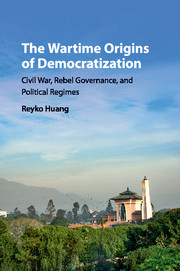Book contents
- Frontmatter
- Contents
- List of Figures
- List of Tables
- List of Acronyms
- Acknowledgments
- 1 Introduction
- 2 War-Making, Mobilization, and Democratization
- 3 Rebel Governance: How Rebels Interact with Ordinary People During Conflict
- 4 Testing the Effects of Rebel Governance on Postwar Democratization
- 5 Tracing the Steps from War Time to Peace Time: Case Studies Overview
- 6 War and Change in Nepal
- 7 War and Postwar Regime Formation in Uganda, Tajikistan, and Mozambique
- 8 Conclusion
- Appendix Rebel Governance Dataset: Notes, List of Cases, and Summary Statistics
- Bibliography
- Index
3 - Rebel Governance: How Rebels Interact with Ordinary People During Conflict
Published online by Cambridge University Press: 05 September 2016
- Frontmatter
- Contents
- List of Figures
- List of Tables
- List of Acronyms
- Acknowledgments
- 1 Introduction
- 2 War-Making, Mobilization, and Democratization
- 3 Rebel Governance: How Rebels Interact with Ordinary People During Conflict
- 4 Testing the Effects of Rebel Governance on Postwar Democratization
- 5 Tracing the Steps from War Time to Peace Time: Case Studies Overview
- 6 War and Change in Nepal
- 7 War and Postwar Regime Formation in Uganda, Tajikistan, and Mozambique
- 8 Conclusion
- Appendix Rebel Governance Dataset: Notes, List of Cases, and Summary Statistics
- Bibliography
- Index
Summary
In the following chapters, I conduct quantitative and qualitative tests of the book's main hypotheses on the effects of rebel governance on postwar political regimes. Before doing so, I devote this chapter to examining the theory's main explanatory concept, rebel governance, and the two variables I use to capture it quantitatively, namely, rebel income sources and rebel institution-building. While the outcome variable, democratization, has been the subject of generations of theoretical and empirical research, rebel governance – that is, rebel groups’ efforts to build political relations with civilians during civil war – has until recently escaped the kind of abiding attention needed to bring an issue to intellectual light. In this chapter, and indeed in this book as a whole, I aim to contribute to the budding research agenda on what actors – in this particular case, the rebels and civilians – do during internal conflict. Civil war is a continuation of politics and, as I will show, actors expend ample efforts on political organization, mobilization, contention, and legitimation in its course. Rebel governance is a significant force in civil war, with a potential to change its dynamics, outcomes, and even subsequent developments once the war has ended.
In this chapter, I first reflect on the state of rebel governance in scholarly works. Defining the term, I argue for the usefulness of serious theoretical and empirical work on the subject. The main material with which I explore the empirical nuts and bolts of rebel governance is an original dataset documenting rebel governance for all major civil wars that ended between 1950 and 2006. I describe the dataset and its variables; importantly, I also discuss some of the challenges of constructing a dataset of this sort. I use this dataset first to descriptively examine the various sources of rebels’ wartime income, then to analyze what factors lead rebels to rely on civilian contributions as opposed to other funding sources. I then turn to rebel “statebuilding” during civil war. I examine what rebels do with their funds in terms of political organization and governance of civilians, and how prevalent rebel statebuilding has been in the civil wars since 1950. Note that the chapter's aim is by and large empirical; I document variation in rebel governance but do not develop a theory to account for it, drawing instead on existing works to identify some hypotheses.
- Type
- Chapter
- Information
- The Wartime Origins of DemocratizationCivil War, Rebel Governance, and Political Regimes, pp. 50 - 82Publisher: Cambridge University PressPrint publication year: 2016
- 1
- Cited by



